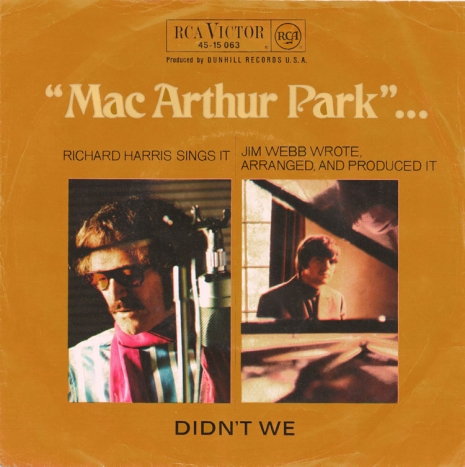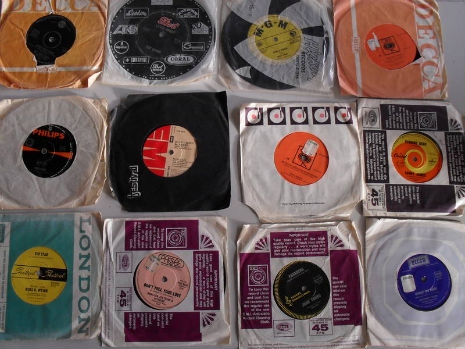
Jimmy Webb’s “MacArthur Park” is one of the most powerfully evocative and epically heart-breaking “love lost” songs ever written. It is preposterous, although it is not kitsch. It is sublime. It’s a masterpiece for the ages.
But it drives some people nuts.
“MacArthur Park” was once ridiculed by “humorist” Dave Barry as the “worst song in modern history” and as having the “worst lyrics.” (Then again if Dave Barry is yer barometer o’ musical taste…) Others, more generously, have called the lyrics to “MacArthur Park” among the most misunderstood in pop music history, but until fairly recently, the great songwriter himself was always somewhat coy about the meaning. And why shouldn’t he have been? What might seem to be obtuse imagery was anything but—and he obviously knew this—but why ruin what people projected onto his words when they heard the song by explaining exactly what it meant to him? Many people probably have their own deeply held versions of what that song is “really” about. To them. It’s one of the key elements that makes “MacArthur Park” so personal for so many people.
After years of listening to and enduring what I’m sure must have been annoying efforts to either perform an exegesis on “MacArthur Park,” or simply lampoon it, Jimmy Webb spilled the beans about one of his greatest songs to the Guardian in 2013:
The lyrics to “MacArthur Park” infuriate some people. “Someone left the cake out in the rain/ I don’t think that I can take it/ ‘Cause it took so long to bake it/ And I’ll never have that recipe again.” They think it’s a psychedelic trip. But everything in the song is real. There is a MacArthur Park in Los Angeles, near where my girlfriend worked selling life insurance. We’d meet there for lunch, and there would be old men playing checkers by the trees, like in the lyrics.
I’ve been asked a million times: “What is the cake left out in the rain?” It’s something I saw… But as a metaphor for a losing a chapter of your life, it seemed too good to be true. When she broke up with me, I poured the hurt into the song.
In an interview with Newsday the following year, Webb further explained:
Everything in the song was visible. There’s nothing in it that’s fabricated. The old men playing checkers by the trees, the cake that was left out in the rain, all of the things that are talked about in the song are things I actually saw. And so it’s a kind of musical collage of this whole love affair that kind of went down in MacArthur Park. ... Back then, I was kind of like an emotional machine, like whatever was going on inside me would bubble out of the piano and onto paper.
It was not the only deeply longing love song that he’d write for this same woman. Immoralized as the girl with “the yellow cotton dress foaming like a wave on the ground around your knees,” Suzy Horton was also the muse for “By the Time I Get to Phoenix,” “Where’s the Playground, Susie” and “Didn’t We.” They’d met when they both attended the same high school in Colton, CA and Webb had carried a torch for her for years. She was apparently somewhat less than sold on him, however. When Webb found out that Horton was getting married, he composed “The Worst That Could Happen” (a hit for the Brooklyn Bridge) with the heart-ripping refrain:
“Girl, I heard you’re getting married, heard you’re getting married…. maybe it’s the best thing for you, but it’s the worst that could happen — to me.”
“MacArthur Park” and its epic musical detailing of the end of their relationship was offered to chart-topping vocal group the Association as a cantata—their producer Bones Howe had asked him to write something elaborate and orchestral for the band, and this was what Webb had come up with—but the composition was rejected for being too long.
Around this same time, Webb got chummy with Irish actor Richard Harris, who he got drunk with backstage at a charity event in Los Angeles. Harris sent the composer a telegram asking him to come to London to record an album, and Webb joined him. “MacArthur Park” was the final song in the pile and when he played it for Harris, the actor told him he’d give him his car—a Rolls-Royce Phantom Five—if the song became a hit (it was and he never did).
A shitton of “MacArthur Park” after the jump…






